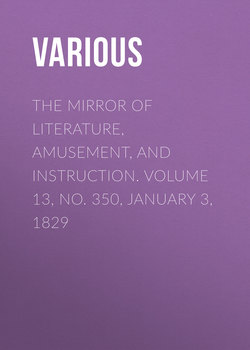Читать книгу The Mirror of Literature, Amusement, and Instruction. Volume 13, No. 350, January 3, 1829 - Various - Страница 8
BRUCE CASTLE, TOTTENHAM
NOSTALGIA—MALADIE DE PAYS—CALENTURE
Оглавление(For the Mirror.)
This disease, according to Dr. Darwin, is an unconquerable desire of returning to one's native country, frequent in long voyages, in which the patients become so insane, as to throw themselves into the sea, mistaking it for green fields or meadows:—
So, by a calenture misled,
The mariner with rapture sees,
On the smooth ocean's azure bed,
Enamell'd fields and verdant trees.
With eager haste he longs to rove
In that fantastic scene, and thinks
It must be some enchanting grove,
And in he leaps, and down he sinks.
SWIFT.
The Swiss are said to be particularly liable to this disease, and when taken into foreign service, frequently to desert from this cause, and especially after hearing or singing a particular tune, which was used in their village dances, in their native country, on which account the playing or singing this tune was forbidden by the punishment of death.
"Dear is that shed, to which his soul conforms,
And dear that hill, which lifts him to the storms."
GOLDSMITH.
Rousseau says, "The celebrated Swiss tune, called the Rans des Vaches, is an air, so dear to the Swiss, that it was forbidden under the pain of death to play it to the troops, as it immediately drew tears from them, and made those who heard it desert, or die of what is called la maladie de pays, so ardent a desire did it excite to return to their native country. It is in vain to seek in this air for energetic accents capable of producing such astonishing effects, for which strangers are unable to account from the music, which is in itself uncouth and wild. But it is from habit, recollections, and a thousand circumstances retraced in this tune by those natives who hear it, and reminding them of their country, former pleasures of their youth, and all those ways of living, which occasion a bitter reflection at having lost them. Music, then, does not affect them as music, but as a reminiscence. This air, though always the same, no longer produces the same effects at present as it did upon the Swiss formerly; for having lost their taste for their first simplicity, they no longer regret its loss when reminded of it. So true it is, that we must not seek in physical causes the great effects of sound upon the human heart."
This disease (says Dr. Winterbottom) affects the natives of Africa as strongly as it does those of Switzerland; it is even more violent in its effects on the Africans, and often impels them to dreadful acts of suicide. Sometimes it plunges them into a deep melancholy, which induces the unhappy sufferers to end a miserable existence by a more tedious, though equally certain method, that of dirt eating.
